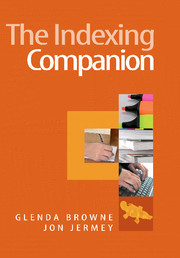Book contents
- Frontmatter
- Contents
- Foreword
- Preface
- 1 The Indexing Work Environment
- 2 Definitions and Standards
- 3 Planning Indexes
- 4 Concepts, Topics and Names
- 5 Selecting Terms
- 6 Controlled Vocabularies for Selecting Terms
- 7 Structuring Indexes
- 8 Quality Control and Interoperability
- 9 Specialised Source Material: Formats, Subjects and Genres
- 10 Software and Hardware
- 11 Threats and Opportunities in Indexing
- References
- Appendix: Selected websites
- Index
11 - Threats and Opportunities in Indexing
Published online by Cambridge University Press: 05 June 2012
- Frontmatter
- Contents
- Foreword
- Preface
- 1 The Indexing Work Environment
- 2 Definitions and Standards
- 3 Planning Indexes
- 4 Concepts, Topics and Names
- 5 Selecting Terms
- 6 Controlled Vocabularies for Selecting Terms
- 7 Structuring Indexes
- 8 Quality Control and Interoperability
- 9 Specialised Source Material: Formats, Subjects and Genres
- 10 Software and Hardware
- 11 Threats and Opportunities in Indexing
- References
- Appendix: Selected websites
- Index
Summary
No one can foretell how the rooster will crow whilst it is yet in the egg.
Basuto proverbTHE INDEXING PROFESSION is threatened on many fronts. Activities in periodical and database indexing that were done by humans are being taken over by computers because they are cheaper, even though they may not index as well, and the increasing amount of material in electronic formats means that search engines have an ever-larger role to play in retrieval.
At the same time as the avenues for work appear to be declining, some of the existing work is being outsourced to countries other than the country of publication. This is putting downward pressure on indexing rates in traditional indexing countries, while at the same time offering new indexing opportunities in the countries taking on the work.
On the other hand, many indexers are busier than ever. Book indexing has not yet been passably replicated by a computer, and index quality can make a difference to sales, especially for textbooks where users have specific, easily defined needs. The indexing of high-importance databases such as MEDLINE is still mostly manual, with some automation. Many non-electronic documents from the past merit indexing. Corporate intranets and websites often use experts in metadata and thesaurus construction for large projects and ongoing consultancies. Finally, indexers need to be entrepreneurial and create information products of their own.
- Type
- Chapter
- Information
- The Indexing Companion , pp. 195 - 204Publisher: Cambridge University PressPrint publication year: 2007



